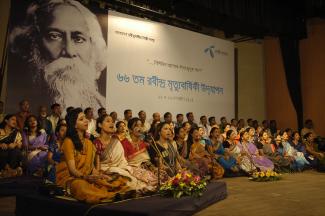Rabindranath Tagore
Poet, polymath, preceptor

The Tagores realised the potential in Bengal’s creativity and did what they could to preserve it, getting the sophisticated ladies in Santiniketan to promote the craft amongst village women. Rabindranath’s father Debendranath Tagore was a prominent reformist Hindu theologian, who spoke out against sati, the tradition of burning widows on their husband’s funeral pyre.
The Tagore family was serious about changing mindsets and overall emancipation of society. Art, culture and literature were effectively used to promote inclusive development. Through his music, Rabindranath helped knit the country together to fight against the British colonialists. However, mere political independence would not do. Economic independence, especially for women, was just as critical.
Promoting handicrafts made sense in this context. Kantha embroidery held special appeal because it was a gender specific craft. Tagore understood perfectly well that women needed it to earn money.












